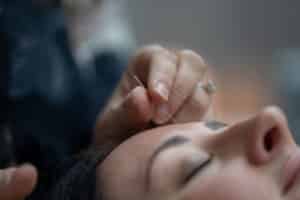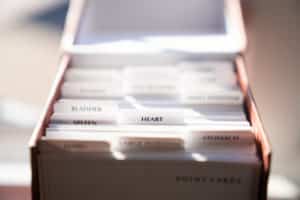Table of Contents
Infertility, Hormone Imbalance, Acupuncture and Chinese Herbs
Infertility is a common problem with sufferers of endometriosis or other woman’s problems. It has become increasingly common with the use of birth control pills and environmental estrogens in our foods. They often cause hormonal imbalance (excessive estrogens relative to progesterone) and anovulation (failure to ovulate). According to the Canadian Medical Association Home Medical Encyclopedia [editor: Peter Morgan, The Readers Digest Association (Canada) Ltd., Montreal, 1992], “anovulation is the most common cause for female infertility. Failure to ovulate often occurs for no obvious reason. It can be caused by hormone imbalance, stress or a disorder of the ovary such as tumour or cyst”.
Infertility and estrogen, progesterone
Other than anovulation, another common cause for female infertility is excessive estrogen. The following quotes are from the book “Physiology” [Selkurt, E.E. (editor), Little, Brown and Company, Boston (1966)]:
“Estrogen administration can lead to failure of implantation of the ovum.” (p. 757).
“Estrogens stimulate the smooth muscle of the oviduct to increase the peristaltic action in the direction from the uterus to the ovary. This may be of benefit to sperm transport but if the activity is too great, it prevents the passage of the ovum down the tubes to the uterus” (p.757).
“Progesterone acts on the reproductive tract and mammary gland in such a manner as to prepare the tract for implantation of the fertilized ovum and to maintain gestation and lactation.” (p. 758).
“Pregnancy can be established and maintained only if adequate amounts of progesterone are secreted prior to and throughout the course of pregnancy.” (p. 765).
It is clear that excessive estrogens and insufficient progesterone play an important role in the failure of implantation of the ovum and maintenance of pregnancy because progesterone secretion is necessary for attachment of the ovum and securing of the fetus to the uterus.
Infertility and liver health
Since the liver is the most important organ for estrogen removal and hormone regulation, liver health is important for fertility. We have observed many cases where the use of the liver cleansing and strengthening product “Chinese Bitters” has apparently helped conception. “Chinese Bitters” is also helpful in inducing menstruation for women who suffer from amenorrhea (absence of periods).
According to Chinese medicine, Chinese Gentian (the main ingredient in Chinese Bitters) exerts “downward pressure” in the body. This probably explains why it helps the fertilized ovum to travel down and get implanted in the uterus. However, once pregnancy starts, the use of Chinese Bitters should be stopped as the “downward pressure” may be too strong for the pregnancy. In general, Chinese Bitters should be taken only during the first half of the menstrual cycle. Once conception has been ruled out, it may be continued in the second half of the cycle. We have good success in helping conception by the following regimen:
- Take Chinese Bitters (if no conception has taken place) until the period starts;
- Stop taking Chinese Bitters during the period;
- Start taking Chinese Bitters again for 5-6 days, as soon as the period is over, and then stop again (just before ovulation starts);
- If conception takes place, the use of Chinese Bitters is no longer needed. If there is no conception, the period will start again. Then repeat step 3 above.
We have good results with taking Chinese Bitters and Coptis for at least one whole cycle, then followed by liver and gallbladder flush just before the next period or on the first day of the period. After the period, follow Steps 3 and 4. Many women became pregnant after their first flush. Estrogens are in their highest levels shortly before menstrual bleeding. Liver and gallbladder flush during this time can bring down estrogens significantly.
Surgical intervention may also cause blockage in the oviduct. In this situation, the blockage may be formed by scar formation which is not supported by estrogens and it would be difficult to unblock it.
Dietary sources of estrogens may also play some role in infertility, especially when the liver is already weak. Both dairy products and meat (especially animal fat) have estrogen contents. Pesticide sprays (xenoestrogens) also contribute to our estrogen intakes. In addition, many herbs and foods have estrogenic activities. Some of these herbs and foods are given in Section 4 above. It is advisable for anyone with infertility problems to watch her diet and minimize estrogen intakes.
Success Stories
Case 1
A woman who used birth control pills for her dysmenorrhea for 6 years starting at the age of 16 wanted to start a family in her late twenties. She tried for more than one year without success. She found out she was not ovulating by measuring her temperature for 10 months. The first month after she started taking Chinese Bitters, she had ovulation (measurable temperature rise) and she became pregnant. She had a second child a couple of years later, again with the help of Chinese Bitters. Incidentally she had her gallbladder removed after her first child. She told me that her ovulation and menstruation are still irregular if she does not regularly take Chinese Bitters (cleanses the liver; regulates hormones) and Coptis (stimulates bile flow).
Case 2
A 34-year old woman who already had a 5-year old girl and had tried for another child for more than one year with the aid of traditional Chinese medicine without success. It did not work because traditional Chinese medicine lacks understanding of hormones. Her situation appears to be hormone-related because she became pregnant the first month after she took Chinese Bitters.
Case 3
A 35-year old woman was on fertility drug for more than half a year without success. She became pregnant the first month after she took Chinese Bitters. In this case, failure of implantation of the ovum was most likely the cause of her infertility.
Case 4
A woman was told by her doctor that she would never get pregnant because her fallopian tubes were blocked. By reducing her estrogens with Chinese Bitters and Coptis in addition to daily morning exercise and Taheebo tea, she became pregnant in 3 months. It appears that her fallopian tubes were blocked by estrogen supported growth. When her estrogens were reduced due to more efficient liver, the growth shrank and her tubes were unblocked
Julia Chang, MSc
Acupuncture and IVF at The Welwyn and Hatfield Practice
Acupuncture is proving to be truly complementary to the modern western conventional treatments offered for fertility. Not only has research proved its ability to enhance the effectiveness but it also helps the body to deal with the side effects of the drugs and relieve some of the stress and anxiety which is inevitable with this type of treatment.
Recent research has shown that acupuncture increases the success rates of IVF and IVI by almost 50%. Studies show that acupuncture decreases stress and increases blood flow to the uterus/fallopian tubes and ovaries. It can increase the thickness of the womb lining overnight by almost 4-6 inches. It also deceases cramping in the womb after IVF treatment thereby decreasing expulsion of the embryo. It is known to assist the implantation of the embryo.
Ideally best results are seen if acupuncture commences 2-3 months prior to IVF/IVI. During this time the menstrual cycle is balanced, the uterus is nourished and the quality of the eggs is increased.
However, if time is of the essence then starting acupuncture sessions as soon as possible will have a positive effects on the outcome of your treatment.
Generally I would see you weekly throughout the IVF process and then before/after egg collection and embryo transfer. Treatment can then be continued weekly for a while to maintain the infertility of the pregnancy.
High FSH
High FSH levels according to TCM indicates a deficiency in Ki Yin E, which is normally needed to make good, fertile eggs. As in western medicine, fertility decreases with age, in TCM the Ki Yin and energetics of the Ki decreases with age. Acupuncture nourishes and supports the Ki Yin and thus decreases raised FSH levels. FSH levels can also be related to factors such as movement of blood in the uterus or the emotional state of a person – in these circumstances acupuncture can stabilise FSH levels.
FSH
A baseline FSH blood test on day 3 of the menstrual cycle gives an overall indication of the ‘ovarian reserve’ which is the capacity of the ovary to provide eggs that are capable of fertilisation resulting in a healthy pregnancy.
Increased FSH generally represents a reduced egg supply and may also reflect a decrease in egg quality.
Generally FSH levels are expected to be below 10 miu/ml levels of 10-15 miu/ml are considered borderline.
Call Helen Taylor – weekes at The Welwyn and Hatfield Practice for further information. We love to spend time explaining what we can do and how we may be able to help.
Hatfield 01707 888229





